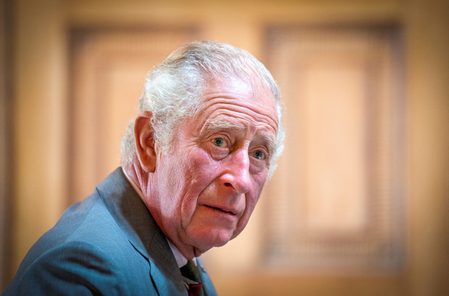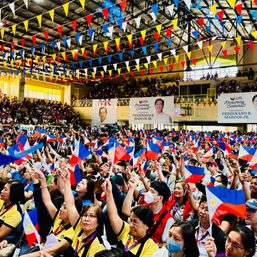SUMMARY
This is AI generated summarization, which may have errors. For context, always refer to the full article.
![[OPINION] Reflecting on Philippine politics while watching the coronation of King Charles III](https://www.rappler.com/tachyon/2023/04/TL-coronation-king-charles-May-3-2023.jpg)
At 6 pm on the 6th of May, Philippine time, the world will witness the first coronation of a British monarch in over 70 years. Only 2,000 guests will be allowed to physically witness the ceremony in Westminster Abbey due to health and safety restrictions, but among them will be the President and First Lady of the Philippines. If we use the two most recent royal weddings as indicators of possible viewership, we can expect that millions around the world will be watching the ceremony. With seven decades passing since the last coronation of a British monarch, the event will likely draw a lot of attention from television and livestream audiences as well.
After the ceremony, the United Kingdom will have a new King, Charles III, and Queen, Camilla. Reports indicate that the coronation will feature historic objects such as ceremonial maces, swords, and an ampulla, which can be dated to as far back as the 17th century. The oldest part of the coronation regalia is a spoon that was reportedly crafted in the 12th century, and has been used at every British monarch’s coronation since 1603.
Although many elements of the coronation ceremony are undeniably traditional, Charles III has expressed a wish to represent the ethnic and religious diversity of contemporary Britain. As King, he will still swear an oath to be “Defender of the Faith,” in his capacity as head of the Church of England. However, palace officials and religious authorities are working to include an additional phrase that allows the King to express that he would serve followers of all of the religious beliefs present in the UK.
The inclusion of these revisions to a ceremony that is steeped in tradition is significant, and represents the King’s awareness of the diversity that exists in contemporary Britain. No longer is the UK homogeneously Caucasian and Christian. Instead, recent UK government statistics have found that 18% of the country’s population are non-white, while Eurobarometer data from 2019 found that only 50% of respondents identified as Christian, while the rest were atheist, Muslim, Sikh, Hindu, or Jewish.
To Filipino readers wondering why the recognition of diversity is so important to the King, it is because of his role as the UK’s Head of State. Apart from performing ceremonial obligations and serving as nominal head of the armed forces, one of Charles III’s chief functions is to symbolize the unity and integrity of Great Britain at home and abroad. Their main role is to be symbols who are dissociated from the messiness of policymaking and implementation. They are accorded prestige and status, but in exchange, they are expected to maintain unblemished reputations that can be useful in maintaining national harmony, and when representing their country internationally.
The actual work of running a government is done by Heads of Government, such as the Prime Minister in Britain or the German Chancellor. Although individuals in these positions wield considerable power compared to Heads of State, their careers are also much more susceptible to criticism and scandal. Consider, for example, how the former British Prime Minister, Boris Johnson, was asked to resign after he was implicated in several ethics scandals. His successor, Liz Truss, likewise stepped down six weeks later after her economic policies led to financial instability in the UK. Despite the dramatic and rapid changes to Heads of Government, the monarch remained a relatively stable and enduring symbol of national unity.
This separation of executive powers between the Head of State and Head of Government is quite different from the arrangement that exists in the Philippines at present. Our political system, which we largely based on the American model, places both the symbolic and policymaking functions in the hands of one person – the President. Adherents to this system argue that combining the roles of the Head of State and Head of Government in one individual is advantageous because it allows for strong and decisive leadership within a fixed tenure. Historically, there have been American and Philippine presidents who have mobilized both their popularity and their control over government resources to bring about dramatic changes, or to respond to difficult crises.
However, these apparent benefits do not take into account the damage to national sentiment that can be caused when a president makes a decision that is considered controversial or unpopular. The country fragments when there is disagreement over a policy, and there is no unifying force to heal the divisions. Furthermore, as symbolic representatives of the country internationally, presidents can negatively impact their country’s image if they are perceived as disreputable. Perhaps dividing the symbolic and policymaking functions of our executive branch may actually help to address this lack of a unifying force.
Thus, as we all turn to our screens to watch the coronation of King Charles III, it may be worth reflecting on the value of having a political figure that can unify the country and serve as a representation of stability during turbulent times. The UK, Belgium, and Sweden have their constitutional monarchs. Germany and Austria have presidents who perform similar ceremonial and symbolic roles. Would the Philippines benefit from having such a person in our political system? – Rappler.com
Manuel R. Enverga III, DSocSci is Director and Assistant Professor at the European Studies Program of the Ateneo de Manila University, where he also serves as Jean Monnet Coordinator. His teaching and research has focused on a diverse set of topics, which include European politics, culture, regionalism, and digital diplomacy. Outside of his academic work, he hosts The Eurospeak Podcast, where he and his guests discuss how European cultural influences impact daily life.
Add a comment
How does this make you feel?


![[EDITORIAL] Ang low-intensity warfare ni Marcos kung saan attack dog na ang First Lady](https://www.rappler.com/tachyon/2024/04/animated-liza-marcos-sara-duterte-feud-carousel.jpg?resize=257%2C257&crop=294px%2C0px%2C720px%2C720px)
![[Free to disagree] How to be a cult leader or a demagogue president](https://www.rappler.com/tachyon/2024/04/TL-free-to-disagree.jpg?resize=257%2C257&crop_strategy=attention)
![[OPINION] Can Marcos survive a voters’ revolt in 2025?](https://www.rappler.com/tachyon/2024/04/tl-voters-revolt-04042024.jpg?resize=257%2C257&crop=251px%2C0px%2C720px%2C720px)
![[Edgewise] Quo vadis, Quiboloy?](https://www.rappler.com/tachyon/2024/03/quo-vadis-quiboloy-march-21-2024.jpg?resize=257%2C257&crop_strategy=attention)
There are no comments yet. Add your comment to start the conversation.